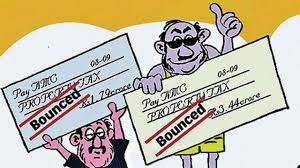- Home
- About Us
- Practice Areas
- NRI Legal Services
- Matrimonial and Family Laws
- Payment Recovery
- ADR
- Cheque Bounce
- Consumer Law
- Immigration Law
- Criminal Law
- Civil Law
- Motor Accident Claims
- Labour & Employment Dispute
- Property Dispute
- Taxation, Direct and Indirect
- MSME
- Intellectual Property
- Finance & Banking
- Registration & Documentation
- Insolvency & Bankruptcy Code
- Service Law
- Merger & Acquisition
- Legal Metrology
- Blogs
Contact Info

Cheque Bounce and Legal Remedies

Cheque Bounce and Legal Remedies
Cheque Bounce and Legal Remedies
In the world of credit, a bounced cheque can be a frustrating experience for both creditors and debtors. However, for creditors, a bounced cheque also serves as a powerful tool for debt recovery, as cheque bounce proceedings remain unaffected even if the debtor is declared insolvent under insolvency laws.
A cheque is considered dishonored or bounced when a bank refuses to encash it due to various reasons, such as insufficient account balance, overwriting, or expired validity. Cheque bounce cases are widespread across the country, with approximately 40 lakh pending cases currently before the courts.
Causes of Cheque Bounce
Cheque bounce incidents occur for several reasons, including:
- Expiry: Presenting a cheque after three months from the date of issuance renders it invalid.
- Erroneous Account Number: An incorrect account number makes the cheque invalid.
- Contradiction in Amounts: Discrepancies between the amounts mentioned in words and figures result in dishonor.
- Inconsistent Signature: Mismatches between the signature on the cheque and the account holder’s official signature lead to dismissal.
- Overwriting or Illegible Writing: Overwritten or unclear details, such as account number or amount, invalidate the cheque.
- Closed Bank Account: If the account is closed by the holder or the bank, the cheque is returned.
- Exceeded Overdraft Limits: Breaching the maximum withdrawal limit results in dishonor.
- Payment Withheld: A payment stop request by the account holder dishonors the cheque.
- Insufficient Funds: Inadequate account balance to cover the cheque amount results in a bounce.
Essentials for Action Under Section 138
To initiate legal action under Section 138 of the Negotiable Instruments Act, 1881, the following conditions must be satisfied:
· Issuance of a Valid Cheque: The cheque must be legally enforceable.
· Presentation for Payment: The cheque must be presented to the bank within its validity period.
· Dishonor of Cheque: The bank must reject the cheque due to reasons such as insufficient funds.
· Notice to Drawer: The payee must notify the drawer within 30 days of dishonor.
· Failure to Pay: The drawer must fail to make the payment within 15 days of receiving the notice.
The process adheres to the 30-15-30 rule:
- 30 Days Notice: The creditor must issue a demand notice within 30 days of dishonor.
- 15 Days to Respond: The debtor has 15 days to pay or respond to the notice.
- 30 Days to File a Complaint: If the debtor fails to respond or pay, the creditor can file a complaint within 30 days, on expiry of 15 days to respond, before the local Judicial Magistrate.
Benefits of Cheque Bounce Proceedings
· Interim Compensation (Section 143A): Courts can order the drawer to pay up to 20% of the cheque amount as interim compensation. If acquitted, the complainant must return the amount.
· Deposit in Appeals (Section 148): Appellate courts can direct the appellant (convicted drawer) to deposit at least 20% of the fine or compensation awarded by the trial court. This amendment discourages delay tactics and ensures justice for the payee.
· Compoundable Offense: Compounding under Section 138 offers benefits such as:
1. Speedy resolution of disputes.
2. Guaranteed payment of dues.
3. Reduced legal costs.
4. Opportunities for amicable settlements.
Anuj Dewan & Associates specializes in providing expert legal solutions for cheque bounce matters under Section 138 of the Negotiable Instruments Act. With extensive experience in handling cases across Punjab, Haryana, Chandigarh, and New Delhi, the firm ensures that client interests are safeguarded through effective and timely legal remedies.
Our team offers end-to-end support, including:
- Drafting and serving demand notices.
- Filing complaints under Section 138.
- Obtaining interim relief and compensation.
- Representing clients in appellate and trial courts.
At Anuj Dewan & Associates, we are committed to achieving optimal outcomes for our clients, minimizing legal complexities while ensuring justice is delivered efficiently.
Links
Other Links
Copyright @2024 Zeicle Tech.All Rights Reserved
